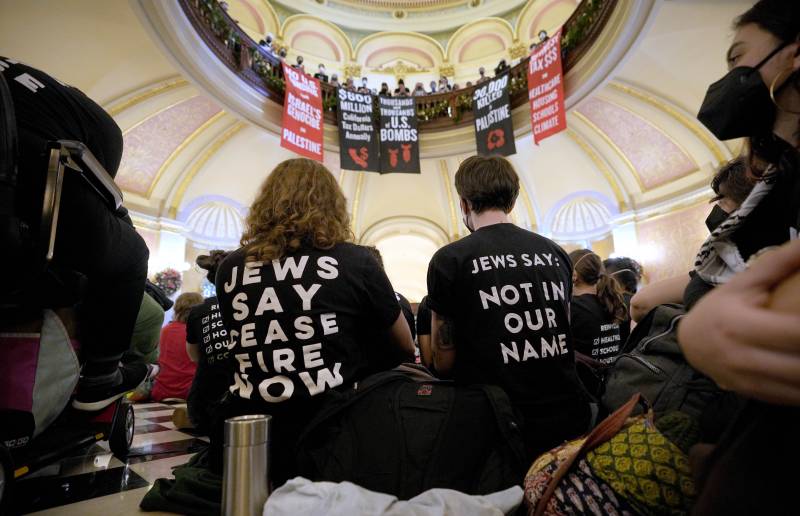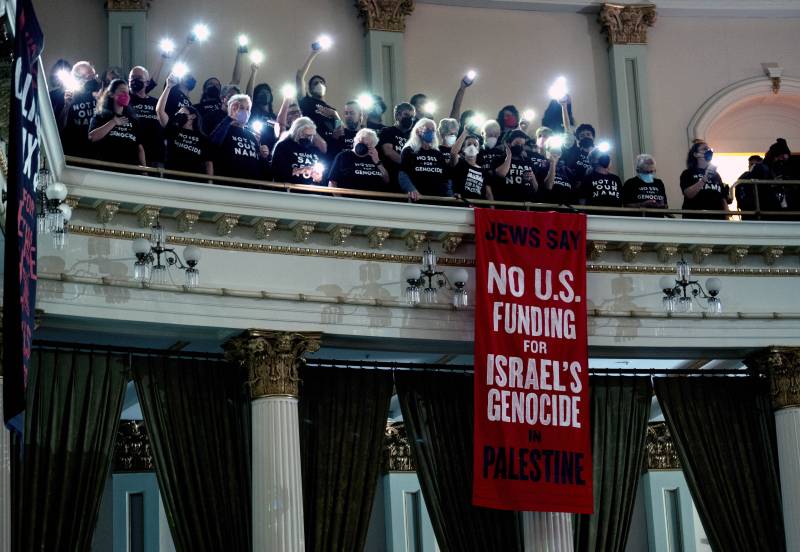Kóatz said the groups chose to protest at the California Legislature because, while those lawmakers do not control federal money sent to Israel, “we know that state Legislatures have the ear of their national counterparts in California and that getting this body to call for a cease-fire now can put California at the forefront of the national movement.”
It’s not the first time protesters have called for a cease-fire disrupted events in California’s capital. In November, protesters forced their way inside a Sacramento convention hall and prompted the California Democratic Party to cancel some events during their nominating convention. And last month, Democratic Gov. Gavin Newsom canceled an in-person Christmas tree lighting ceremony after protesters planned an action at the event.
Protesters did not disrupt the state Senate, which held its session as scheduled and included lawmakers giving speeches in memory of former U.S. Sen. Dianne Feinstein, who died in September.
Across the country, it was a day of disruptions at state capitols. A bomb threat emailed to officials in multiple states prompted evacuations of statehouse offices or buildings in Connecticut, Georgia, Hawaii, Kentucky, Maine, Michigan, Minnesota, Mississippi and Montana. Other states — including Missouri, Maryland, Nebraska, New Hampshire, Oklahoma and Wyoming — received threats but did not evacuate. The brief email threat made no mention of a motive and did not reference the Israel-Hamas war.
California’s legislative session, which runs through Aug. 31, is expected to be dominated by decisions on artificial intelligence and the massive budget deficit. But as Wednesday’s protest showed, the ongoing fallout from the Israel-Hamas war and its climbing death toll will likely have an impact.
The California Legislative Jewish Caucus sent a letter to state lawmakers on Wednesday, calling for the creation of a committee to explore policy changes to protect the Jewish community.
“We have our own criticisms of Israel. We want the war to end,” said Democratic state Sen. Scott Wiener of the Jewish caucus. “We also know the cease-fire resolutions we see at the local level have at times gone off the rails in terms of dredging up a lot of anti-Jewish hate, and that causes a lot of fear in our community.”
Assemblymember Jesse Gabriel, a Democrat from Los Angeles, said his 3-year-old child now has to walk through metal detectors to enter his preschool at a local synagogue.
“The level of fear and anxiety and tension is unlike anything I have ever seen in my lifetime,” Gabriel said.
Lawmakers are scheduled to return to the chamber on Thursday morning. But the bulk of their work will come later after the governor reveals his plan to cover an estimated $68 billion deficit — a shortfall larger than the entire operating budgets of many states.
And with many California companies at the forefront of the artificial intelligence boom, a number of state lawmakers are eyeing ways to govern the use of the technology before it dominates daily life — much like social media.
State Sen. Steve Padilla proposed a measure Wednesday to require California to establish safety, privacy, and nondiscrimination standards around generative AI tools and services. Those standards would eventually be used as qualifications in future state contracts. He also introduced a plan to create a state-run research center to study the technology further.
Assemblymember Akilah Weber said she’ll try to tackle “deepfakes” through a bill that would require labeling of AI-generated content.

